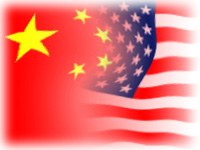
Mike Langberg from the San Jose Mercury News (Silicon Valley's hometown paper) has a great article discussing practical steps U.S. companies can take to "climb China's Great Firewall." A flurry of news stories, many amplified by the blogosphere, have helped to put public pressure on U.S. Internet companies doing business in China, such as Yahoo!, Google, and Microsoft. The U.S. House of Representatives recently held hearings on the subject, and Langberg says this could lead to a set of voluntary principles by which U.S. companies abide by when trying to capture their share of the Chinese Internet market, which is already larger than the U.S. in terms of users:
It's easy to condemn Internet censorship in China.According to Langberg, the Sullivan Principles directly contributed to the collapse of South Africa's apartheid government. One expert quoted in the article suggests three basic principles:
Yet it's hard to come up with an appropriate response.
Technology companies in the United States can't afford to stay out of China, the world's most populous nation and almost surely destined to become the world's largest economy.
At the same time, no foreign company supplying Internet hardware or services can enter China without first agreeing to support the ``Great Firewall'' of online censorship erected by the ruling Communist party.
And any company taking a solo stand against Beijing's online censorship will be promptly booted out of the country.
There's only one way out of this moral quicksand: A clear and consistent set of principles for what U.S. tech companies can and can't do in China. Perhaps something like the Sullivan Principles from 30 years ago, which set guidelines for how multinational corporations should do business in what was then the apartheid state of South Africa.
• Transparency. Companies operating in repressive countries should always disclose what they're doing, including what products they are selling to government agencies involved in censorship and what restrictions they are imposing on users. Google, for example, has pledged to always alert users when search results omit censored material.I think a set of agreed principles is a great idea. I would add that U.S. companies should use Chinese law to reinforce their users' freedom of speech. I believe any company that goes out of its way to protect its users' rights under the law will be rewarded by consumers, as is the case in the United States. This would also put enormous social pressure on the Chinese government to abandon a hopeless war against free speech.
• Non-collaboration. Companies should not actively participate in acts of repression. Yahoo, for example, could move its e-mail servers out of China so the company would not have to respond when authorities attempt to read users' messages.
• Gentle resistance. Companies should interpret restrictive rules as liberally as possible, thereby challenging attempts to scare them into self-censorship.
1 comment:
Excellent points. You should send this post to your congressmen, as well as the Pres and VP.
Post a Comment